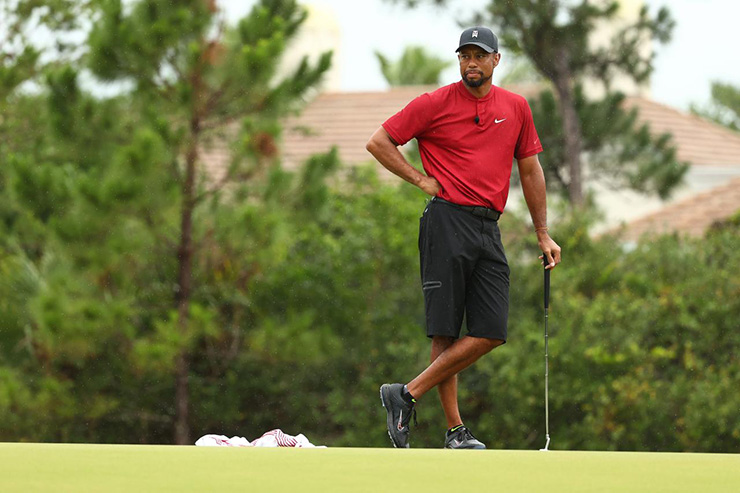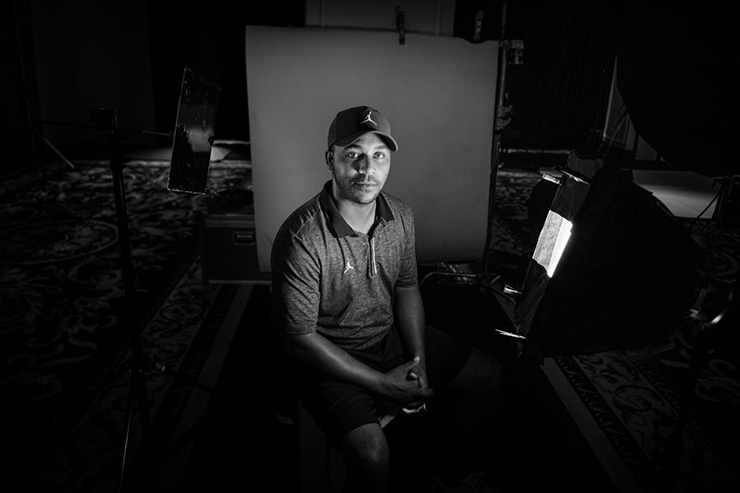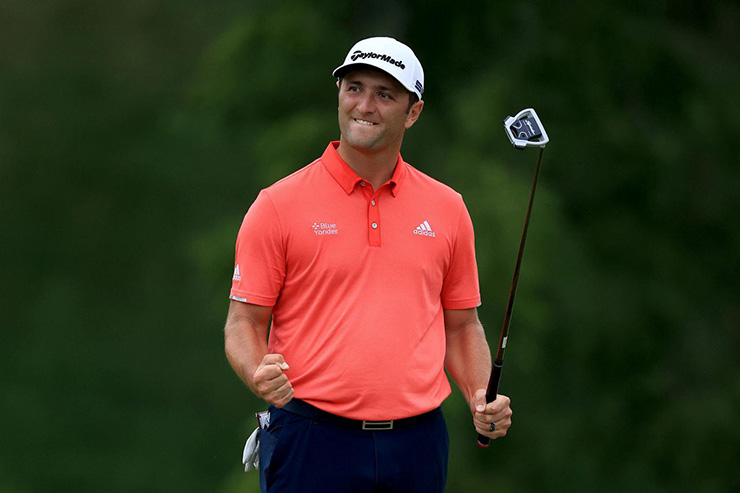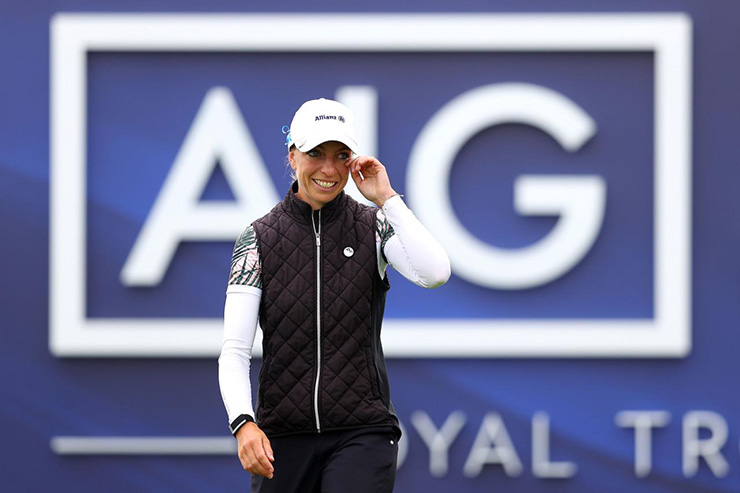By Daniel Rapaport
How do you recap a golf year unlike any other? In birdies? Bogeys? Trophies? COVID tests?
All reasonable suggestions and perfect jumping-off points for other end-of-year lists. But sports are about people. So for this list, we’re going to re-live this most strange year through people’s words. From Torrey Pines to Augusta, from Kobe to Bryson to DJ to some more Bryson, here are 18 quotes that defined the wild journey that was golf in 2020.
• • •
“I don’t know if his genetics ever make him look good to be honest. That body issue—he didn’t have any abs. I got some abs.” —Bryson DeChambeau, Jan. 15
This came during one of DeChambeau’s late-night Twitch streams and it set off another back-and-forth in the ever-simmering feud between the noted golf nerd and Brooks Koepka, noted golf cool guy. Bryson was asked about his ongoing body transformation in comparison with Koepka, who had just posed nude for the ESPN body issue. Clearly, DeChambeau wasn’t impressed. Koepka, not the type to look past a slight, fired back by posting a picture of his four major-championship trophies with the caption “2 short of a 6 pack.” I mean, how else did Bryson think this would end?
You were right @b_dechambeau I am 2 short of a 6 pack! pic.twitter.com/aCJ1jimId6
— Brooks Koepka (@BKoepka) January 16, 2020
• • •
“He shot free throws with a torn Achilles. It’s hard to imagine he could have the sniffles, let alone have something like this happen.” —Max Homa, Jan. 26
NBA icon Kobe Bryant died in a helicopter crash during the final round of the Farmers Insurance Open, which led to a bizarre scene in which the golf tournament felt secondary. Most players—including Tiger Woods—found out after their rounds, and many were visibly shaken at the tragic news. Chief among them was Homa, a Southern California native and a diehard Lakers and Kobe fan. Justin Thomas, Matthew Wolff and Tony Finau were among a number of players who paid tribute to Bryant at the following week’s Waste Management Phoenix Open.
• • •
“I’m probably the only one who’s not playing. Same number as the sanitizers in the clubhouse, locker room and dining.” —C.T. Pan, March 12
In a since-deleted tweet, Pan explained his reasoning for withdrawing from the Players Championship prior to the first round. This marked the first real encroachment of COVID-19 on the PGA Tour; there was sparse talk of it the week prior at Bay Hill, but worries mounted as the Players practice rounds wore on and other sports, notably the NBA, put their seasons on hiatus. Pan was the only golfer to withdraw over safety concerns, but by the time Thursday’s opening round was underway, it was unclear whether the tournament would make it to Sunday. At noon on Thursday, just as Hideki Matsuyama was polishing off perhaps the most under-the-radar 63 in golf history, PGA Tour commissioner Jay Monahan announced that the Players and all events through the Valero Texas Open would be played without fans. Ten hours later a different announcement came.
RELATED: Counting down the top 25 Newsmakers of 2020
• • •
“We’re obviously incredibly disappointed to suspend the PGA Tour season for our players, and our fans.” —Jay Monahan, March 13
Monahan was speaking at a press conference on Friday, but the brutal news dropped on Thursday night: that all events up through Valero Texas Open had been cancelled. That same Friday, Augusta National announced that the Masters would not be played in April. In the span of 24 hours, the PGA Tour had gone from all systems normal to a full-on cancellation through mid-April. And that, as we now know, was just the beginning.

Cliff Hawkins
• • •
“Billy, JT, Charley, whoever else wants to do this Peloton thing while we’re in quarantine, or social isolation or whatever you want to call it … I beat you again.” —Rory McIlroy, March 21
The quarantine period saw a number of PGA Tour players satisfy their appetite for competition with … cycling? Interactive Peloton rides became the new anti-boredom cure, with Rory McIlroy emerging as the leader of the spinning crew. Golfers organized live rides against each other as well as fundraising rides for different philanthropic causes.
• • •
“The R&A has decided to cancel The Open in 2020 due to the current COVID-19 pandemic.” —Joint statement Augusta National, PGA Tour, R&A, USGA, LPGA, European Tour, April 6
If there’s one positive that came from the COVID-19 hiatus, it’s increased cooperation between golf’s power players. On what was supposed to be the Monday of Masters week, six governing bodies released a joint statement outlining a best-possible schedule for the rest of 2020. Some highlights, which seemed to many like they were a little unrealistic at the time: the Masters moving to November; the ANA Inspiration moving to September; the U.S. Women’s Open moving to December; the U.S. Open moving to September; and the cancellation of the Open Championship for the first time since World War II. In hindsight, the best-possible schedule became the actual schedule.
• • •
“Yeah, it’s going to be a tough financial year. There’s no way around it. And it’s certainly not going to be any better on the Ladies European Tour or the Symetra Tour, two tours that we obviously, I think, without giving away any secrets, that we help subsidize and will certainly subsidize more in 2020 than we thought when we walked into the year.” —Mike Whan, May 1
The LPGA commissioner painted an honest and sobering picture of COVID hiatus’ impact on the women’s game. In contrast to the cash-rich PGA Tour, the shutdown put women’s professional game in a precarious position. Whan’s forthright and compassionate brand of leadership has been lauded across the sports world as a model for how a commissioner should behave, and he successfully guided the women’s game through an unexpectedly difficult year. The LPGA Tour returned to play on July 31 at the LPGA Drive On Championship.
• • •
“Want me to use one of my U.S. Open medals? … I should have three of them that you can borrow” —Tiger Woods, May 24
This was one of many good-natured jabs from The Match 2: Champions for Charity, Tiger tweaking Phil Mickelson for his close calls at the major. The Match 2 saw Woods and Peyton Manning take down Mickelson and Tom Brady in a highly entertaining made-for-TV match at Woods’ home track, Medalist Golf Club in Florida. This was actually the second such exhibition during the PGA Tour hiatus, as a quartet of TaylorMade stars faced off in a skins match at Seminole the week before. And it wasn’t the last—Manning and Mickelson were joined by Charles Barkley and Stephen Curry for The Match III in Arizona over Thanksgiving weekend. 2020, among other things, shall be known as the year that golf exhibitions made a comeback.

Mike Ehrmann
• • •
“I pray alongside them for George Floyd and his family. And I also pray for our unity. We’re strong. We can go beyond the trap of one-dimensional thinking. Once we do, our eyes will see the righteous, our hearts will feel the love, and we’ll have done more to honour all those subjected to evil and its vile nature.” —Harold Varner III, June 2
The killing of George Floyd by police officers sparked outrage across the globe, and while our sport is not typically at the forefront of social change, the golf world used the moment to do some honest reckoning with itself. As one of very few black players on the PGA Tour, Varner suddenly emerged as an important voice in a game whose history is rife with exclusion. The PGA Tour held a moment of silence during its first tournament after the hiatus, the Charles Schwab Challenge at Colonial, at 8:46 a.m.—a reference to the eight minutes and 40 seconds that an officer pinned his knee into Floyd’s throat before he died. In the months since, the tour outlined a plan to combat racial injustice, Augusta National announced it would fully fund a women’s golf program at a historically black college, and The Match 3 raised more than $5 million for historically black colleges and universities.

• • •
“I think there’s a lot of bunkers that are around, like, 290, so hopefully I’ll be able to clear those and take those out of play. So, sorry, Mr. Ross, but, you know, it is what it is.” —Bryson DeChambeau, June 30
As far as actual golf storylines, DeChambeau’s bulk-up dominated discourse virtually all summer. He showed up to Colonial some 30-odd pounds heavier than he had been just three months earlier, a hard-to-believe transformation. A late bogey cost him a spot in a playoff, but it became clear that this was no side-show. He finished T-8 and T-6 in his next two starts, then showed up to the Rocket Mortgage Classic at Detroit Golf Club, a 1910s-era Donald Ross design that proved no match at all for his thunderous power—he shot 23 under and won by three. The above quote, while undoubtedly humorous, was also rather poignant, underscoring how a player hitting the ball 350-plus yards can nullify so many great architectural challenges of classic golf courses.
• • •
“It’s pretty surreal to think it’s happened this quickly. How many people get to achieve a lifelong dream in their mid-20s?” —Jon Rahm, July 19
Rahm became just the second Spaniard, joining his hero Seve Ballesteros, to become the World’s No. 1 golfer. It happened after a gritty victory at the Memorial, where he tamed a fiery Muirfield Village setup for what looked like a five-shot victory … until the signature moment of the week, his chip-in for birdie on 16, became a chip-in for bogey after a zoomed-in camera showed his wedge causing the ball to move ever so slightly as he addressed it. Good thing margin of victory doesn’t matter on the PGA Tour, or the World Rankings, so the three-shot win was more than enough to see the 24-year-old summit the sport.

Andy Lyons
• • •
“I like my chances—when I’ve been in this position before, I’ve capitalized. I don’t know, he’s only won one.” — Brooks Koepka, Aug. 8
Never one to hide his feelings, Koepka raised some eyebrows with this not-so-subtle dig at his former workout buddy, Dustin Johnson. DJ held the 54-hole lead at the first post-COVID major, the PGA Championship at Harding Park, and Koepka was lurking just two behind when he spoke in his post-round presser on Saturday. He wasn’t wrong, either—Johnson had held three 54-hole leads in majors and converted zero of them, while Koepka had previously had no such problems closing the deal in majors. The controversial comments drew a stark rebuke from Rory McIlroy as well as plenty of golf fans, especially when Koepka shot four over on Sunday to finish T-29. And yet, Johnson’s two-under 68 was also not enough to take home the Wanamaker.
• • •
“I feel very comfortable in this spot. When I woke up today, I was like, this is meant to be. This is where I feel very comfortable. This is where I want to be, and I’m not scared from it.” —Collin Morikawa, Aug. 9.
Morikawa delivered a final round for the ages to win his first major, shooting a bogey-free 64 to leapfrog Johnson and join Jack Nicklaus, Tiger Woods and Rory McIlroy as the only four players to win the PGA Championship before turning 24. It was the third victory of Morikawa’s career, which began only 14 months prior to his first major championship.
• • •
“I almost quit playing last year—thank God I didn’t.” —Sophia Popov, Aug. 23
The biggest upset of the year came at the AIG Women’s British Open at Royal Troon. That’s where the 27-year-old German, No. 304 in the Rolex Rankings, shot a final-round 68 for an unlikely two-shot victory. Popov had trudged through the golf wilderness, struggling both with confidence and health for the past six years—including a bout with Lyme disease—and nearly gave up the game in 2019. It’s a very, very good thing she didn’t.

Richard Heathcote/R&A
RELATED: The best things for golfers to come out of the pandemic
• • •
“It’s not a skill to hit the ball a long way in my opinion. I could put on 40 pounds. I could go and see a bio-mechanist and I could gain 40 yards; that’s actually a fact. I could put another two inches on my driver. I could gain that, but the skill in my opinion is to hit the ball straight. That’s the skill, he’s just taking the skill out of it in my opinion.” —Matthew Fitzpatrick, Oct. 11
The Bryson-distance talk did not cease after his torrid summer that peaked with a six-shot U.S. Open victory, and Matthew Fitzpatrick re-fueled it with these comments at the BMW PGA Championship in England. Not a long hitter himself, Fitzpatrick struck some with his comments as offering the bitter lamentations of a jealous player, but there also were plenty who agreed with his assertion that the game is trending in the wrong direction. DeChambeau, to his credit, took the comments in stride, though he did offer this biting response: “Hey, man I would love to help out.”

Andrew Redington
• • •
“I’m looking at it as a par 67 for me because I can reach all the par 5s in two, no problem. If the conditions stay the way they are, that’s what I feel like par is for me.” —Bryson DeChambeau, Nov. 10
All eyes were always going to be on Bryson at the Masters. He had just bludgeoned the U.S. Openiest U.S Open venue into submission, and he had taken a month off to test a 48-inch driver, and he posted evidence of a 400-yard drive to social media. But he drew even more attention on himself with this comment in the leadup, suggesting Augusta’s four par 5s are par 4s in his head, and the par-4 third is essentially a par 3 because he can drive it so easily. This time, the golf gods punched back—DeChambeau made the cut on the number and was never a factor in finishing T-34. It was not, however, a completely drama-free week …
• • •
“So you’re saying if we can’t find it, it’s a lost ball?” —Bryson DeChambeau, Nov. 13
During the second round of the Masters, DeChambeau took out driver on the third and hit a high hook that found the second cut, which was noticeably longer than usual at this November Masters. The ball was never found, much to the disbelief of DeChambeau, who tried to use every rule in the book to his advantage: Standing water? Nope. Ground under repair? Nope. For non-Bryson fans, there was certainly a hint of gleeful schadenfreude in watching him struggle on the course so many believed he would conquer.
• • •
“I’m sorry. I can’t even talk. I’ve never had this much trouble gathering myself.’’ —Dustin Johnson, Nov. 15
This Masters was so distinctly unusual—in November, and without fans—but through 54 holes, the proceedings had followed a familiar script: Dustin Johnson with the lead in a major heading into the final round. It was the fifth time DJ had been in that position, and he’d gone 0-for-4. This time, however, would be different, even if his original four-shot lead dwindled to one at one point early in Sunday’s round. DJ responded with steady play as the afternoon wore on and cruised to a five-shot victory while setting the 72-hole Masters scoring record. In his post-round interview with Amanda Balionis, the famously stoic Johnson let his guard down, struggling to get a word out as he choked back tears. Clearly, this meant everything to a man who is often portrayed as emotionless and apathetic, and it was wonderful to see. In a year that went so awry, Johnson’s victory stood out as a rare feel-good moment and the culmination of a four-month stretch of dominant golf.









